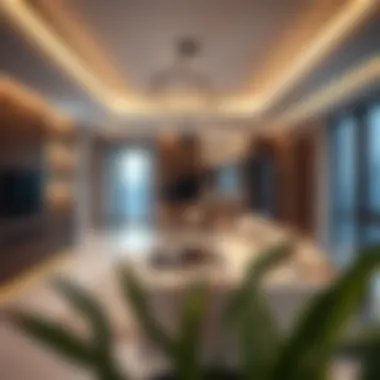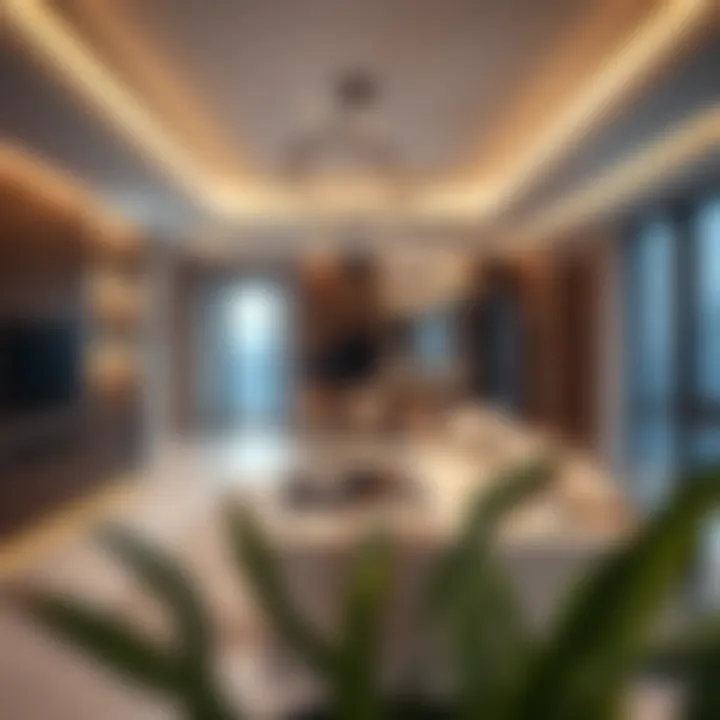Analyzing Trends in Dubai's Real Estate Market 2023


Intro
Dubai's real estate market represents a fascinating blend of ambition and opportunity. It stands as a testament to innovation, showcasing towering skyscrapers amidst sprawling developments that continuously reshape the skyline. This city has captivated the attention of investors and buyers alike, drawn by its promise of lucrative gains and a high quality of life. In the past few years, the market has undergone significant transformations, influenced by shifting economic dynamics and global trends.
Navigating through this vibrant landscape requires a keen understanding of underlying factors affecting property values, current trends, and buyer behavior. As both seasoned investors and first-time buyers venture into the market, they seek comprehensive insights to make informed decisions. This article aims to unravel the complexities of Dubai’s real estate sector, dissecting crucial elements influencing investments and prospective purchases.
Understanding the nuances of the local market not only empowers stakeholders with knowledge, but it also enhances their ability to identify high-potential areas and emerging neighborhoods. From current market analysis to future predictions, we will explore what lies ahead in Dubai's property arena. Together, we will uncover substantial opportunities and emerging trends that define this thriving market, ensuring that readers are equipped to seize the moment.
Prelude to Dubai's Real Estate Market
In recent years, Dubai has emerged as a dazzling gem in the realm of global real estate. The vibrant skyline, punctuated by architectural marvels, is not merely a feast for the eyes but also a portal to lucrative investment prospects. Understanding Dubai's real estate market is essential for anyone looking to navigate this complex landscape—be it investors, real estate agents, buyers, or analysts.
At its core, Dubai's property market is characterized by a unique blend of traditional concepts and innovative practices. The region is bustling with high-net-worth individuals and expatriates seeking both residential and commercial spaces. This dynamic environment presents numerous opportunities for wealth creation and economic growth.
Recent reports underline key factors that contribute to the allure of investing in Dubai's real estate:
- Tax Benefits: The absence of property taxes can significantly enhance investor returns.
- Infrastructure Development: Continuous improvements in transport systems, including the metro and airport expansions, boost property desirability.
- Cultural Hub: Dubai stands as a melting pot of cultures, which attracts diverse demographics ranging from affluent tourists to long-term residents.
- Luxury Lifestyle: Properties in iconic locations, such as the Palm Jumeirah, provide not just a home but an extravagant lifestyle.
Exploring this market offers insights not just into potential gains but also highlights the considerations necessary for informed decision-making. Investors should be mindful of regulations, market fluctuations, and socio-political factors that may influence property values. Given the increasing globalization of investment, a nuanced understanding of buyer motivations cannot be overlooked.
"Being well-informed is the cornerstone of real estate success in a market that operates at such a breakneck speed."
To truly grasp the vast opportunities available, one must consider the intricate relationship between buyer behavior and market trends in Dubai. The following sections will delve deeper into these elements, unraveling how they shape the current landscape and what lies ahead for prospective investors.
Historical Overview of the Property Market
Understanding the historical backdrop of Dubai's real estate market is key for just about anyone interested in investing, purchasing a home, or analyzing trends. This foundation provides an essential context to inform decisions and predict future outcomes. Investment strategies can only be as sound as the historical data supporting them.
Dubai's property market has undergone significant changes over the past few decades. In the late 1990s, the government began to focus on diversifying the economy, reducing reliance on oil. This move opened the door for foreign investments and marked the beginning of the real estate boom. The introduction of the 2002 foreign ownership law was a game changer, allowing non-UAE nationals to buy property in designated areas. Investors were quick to grab the opportunities presented, leading to a rapid expansion of the sector.
As the years rolled on, projects like the Burj Khalifa and the Dubai Marina emerged, symbolizing the city’s ambition and innovation. These developments did not just enhance the skyline but also attracted attention from global investors. Notably, the extravagant projects often served as advertisements for Dubai’s growing status as a luxury destination and a melting pot of cultures.
A pivotal moment occurred in 2008 when the global financial crisis shook the market. Prices plummeted, many projects were halted, and investor confidence faltered. However, the old adage “what doesn’t kill you makes you stronger” proved true; the market rebounded with renewed vigor, thanks to fundamental changes in regulations and more sustainable development practices.
Today, a multitude of governmental initiatives aims to position Dubai as a leading global real estate hub once again. Greater transparency, stronger legal protections for buyers, and a focus on sustainability are all contributing to a burgeoning market. The government’s introduction of long-term visas for investors and skilled professionals further ignites interest.
In essence, the historical overview of Dubai’s property market is not merely a tale of ups and downs but a narrative punctuated by resilience and forward-thinking policies. This history serves as a powerful reminder of the market's capacity for recovery and growth. Knowing where the market has been provides valuable insights on where it might head next.
"Those who fail to learn from history are condemned to repeat it." - Winston Churchill
As we move forward in this article, it will be essential to delve into current market dynamics that are deeply influenced by this rich historical tapestry. Understanding these elements allows investors, agents, and analysts to craft informed decisions.
Current Market Dynamics and Trends
The real estate landscape in Dubai is in a constant state of flux, heavily influenced by economic indicators, demographic shifts, and legislative changes. Understanding the current market dynamics and trends is not merely academic; it's crucial for anyone looking to invest in this burgeoning environment. By grasping these dynamics, investors and buyers can make informed decisions that align with market realities.
In recent years, Dubai has seen a shift in investment focus. Traditionally, luxury estates drew substantial attention. However, the narrative is evolving, with increased interest in affordable housing and community-centric developments. Recent statistics indicate that middle-income housing projects are gaining traction, responding to the needs of a growing population looking for more budget-friendly options.
Key Variables Shaping the Market
Several key factors are steering the direction of Dubai's real estate market:
- Economic Recovery: Following global disruptions, the UAE has managed a solid recovery with increased tourism and international trade, further boosting the real estate sector.
- Government Initiatives: Supportive policies from the government, such as long-term residency visas and tax incentives for foreign investors, add fuel to the fire, making the market more attractive.
- Technological Advancements: The rise of PropTech is changing how transactions are conducted, providing a seamless experience for both buyers and sellers. Virtual tours and blockchain technology are becoming standard practice.
- Changing Buyer Preferences: With a growing desire for remote working arrangements, properties that offer flexibility and community amenities are coming into favor. This shift has caused a rise in demand for suburban developments where quality of life is prioritized.
Market Challenges
Despite the vibrant opportunities, several challenges pose threats as well:
- Oversupply: There is an ongoing concern regarding an oversupply of residential units, particularly in certain sectors, which could lead to price corrections. Investors must tread carefully, ensuring they're investing in areas with genuine demand.
- Global Economic Pressures: Fluctuations in the global market impact local sentiment and can deter foreign investors if uncertainty prevails.
- Market Sentiment: Sentiment can swing like a pendulum, influenced by news cycles and market predictions. A cautious investor must stay informed and adaptable.
"Grasping the nuances of market trends is pivotal for decoding the future landscape of Dubai's real estate."
The End on Current Trends
Keeping one's finger on the pulse of Dubai's real estate trends cannot be overstressed. As we navigate this intricate web of market dynamics, it becomes evident that knowledge and adaptability are priceless commodities. Those who understand these currents equipped with this understanding can harness incredible opportunities in their real estate endeavors.
For more details on the latest data in the Dubai real estate market, you can refer to articles on Wikipedia and Britannica.
Investment Opportunities in Dubai
Dubai's real estate landscape is a cornucopia of investment opportunities that draw both local and international investors alike. Understanding these opportunities is pivotal to making informed decisions in a market that can sometimes feel like a whirlwind. Whether it's residential villas or commercial office spaces, there is a variety to choose from according to different budgets and risk appetites.
The importance of knowing the ins and outs of these investment avenues cannot be overstated. With the right strategy and insights, these investments can yield significant returns over time. Investors must pay attention to various facets, including market stability, projected growth, and socio-economic factors impacting real estate. When done right, investing in Dubai's market is likened to planting a seed in fertile soil; it requires careful attention but can blossom remarkably.
Residential Investment
Investing in residential properties in Dubai presents a unique set of prospects. The city sees a constant influx of expatriates, leading to a continual demand for housing. From modern high-rise apartments in Downtown Dubai to expansive villas in the palm-fringed neighborhoods, the selection is diverse. The growing population not only sustains the demand but also fuels rental prices, which are a major draw for investors.
A few things to consider in residential investment include:
- Location, which influences rental yield and resale value.
- Market sentiment, which can sway dramatically.
- Regulatory framework, important for ensuring ownership and tenancy rights.
Investors keen on the long game often look towards family-oriented communities or areas known for upcoming infrastructure projects. They understand that getting in earlier in these neighborhoods can provide higher returns as the area develops.
Commercial Real Estate
The commercial real estate sector in Dubai offers promising investment opportunities, marked by substantial returns. From office spaces to retail outlets, the commercial property market is robust. One significant factor driving this sector is the city's status as a global business hub, attracting multinational corporations and startups alike.
Investors should be on the lookout for:
- Sector-specific demand, recognizing that demand for office spaces may vary between industries.
- Lease structures, which can affect long-term cash flow.
- Economic forecasts, important for assessing the viability of commercial ventures.
Notably, prime locations such as Dubai Design District and Dubai Silicon Oasis are hotbeds for commercial investment, offering innovative spaces that cater to businesses wanting to make a mark in the region.
Off-plan Properties
The allure of off-plan properties in Dubai remains strong, as it allows investors to purchase at lower prices before completion. This can translate to significant capital gains when the developments are completed. Off-plan properties often come with enticing payment plans, making it easier to enter the market.
Key considerations include:
- Developer reputation, essential in minimizing the risk of delays or quality issues.
- Market analysis, to predict potential returns based on future trends in the location.
- Legal stipulations, knowing the rights and responsibilities as a buyer in off-plan agreements.
Investors who navigate this market effectively often find underserved areas ripe for development, ensuring their investments bloom just as the properties become ready for occupancy.
"Investing in off-plan properties can present a lucrative gap between price and value, translating to significant returns once the structures are complete."
As shown, investing in Dubai offers a landscape that’s both varied and ripe for opportunity. With the right insights, strategies, and market knowledge, investors can make choices that greatly enhance their portfolios.


Factors Impacting Property Valuation
Understanding factors that influence property valuation is crucial for anyone navigating Dubai's real estate market. In this bustling city, property values can fluctuate significantly based on various elements. Recognizing these factors allows investors, agents, buyers, and analysts to make informed decisions, ensuring they capitalize on opportunities and minimize risks.
One of the most compelling insights reflects on how location can dramatically shape property worth. The proximity to essential amenities, major highways, and public transport can either inflate or deflate property prices. For example, a property situated close to shopping malls or schools typically garners higher demand because purchasers often prioritize easy access to amenities. People want it all—convenience, culture, and lifestyle—in the heart of this dynamic city.
Location and Accessibility
The essence of real estate lies in its location. In Dubai, the premium on prime locations is evident. Not only does a property’s location determine its market value, but it also influences buyer interest. Buyers are not motivated by mere square footage; they also consider nearby parks, schools, or the buzz of city life.
Accessibility further enhances this dynamic. Properties located near key transport hubs, such as the Dubai Metro or major road networks, see increased valuations. An effective transportation system can make life more manageable, appealing to professionals commuting across the city. For instance, areas like Downtown Dubai and Dubai Marina are directly served by public transport, making them exceedingly attractive to young professionals.
Moreover, neighborhoods that experience active development or regeneration often see a spike in property values. The ongoing development of infrastructure, be it a new metro line or community hubs, draws attention and investment, thus enhancing property desirability.
Market Sentiment and Economic Indicators
Market sentiment plays a pivotal role in dictating property values in Dubai. How buyers perceive the market and their confidence levels can lead to a domino effect on valuations. When the market sentiment is positive, it often leads to surges in demand, causing prices to rise. Conversely, negative outlooks can precipitate price drops.
Economic indicators such as GDP growth rates, employment statistics, and inflation rates are fundamental in shaping market sentiment. If economic growth seems to be robust, investors feel emboldened to buy, which can push property prices upward. For example, during periods of economic prosperity, there’s likely to be an uptick in luxury real estate purchases, reflecting confidence in long-term investment.
Conversely, economic downturns bring hesitation among buyers. Uncertainty concerning job security or revenue can dampen enthusiasm for purchasing real estate. The resultant decline in demand can lead to stagnation or drops in property values. Thus, keeping an eye on economic trends and global market movements is prudent for anyone involved in the Dubai property scene.
Understanding Buyer Behavior in Dubai
Understanding buyer behavior in Dubai's real estate market is crucial for anyone looking to invest, sell, or analyze properties in the region. The decisions made by property buyers and investors are shaped by a mix of local culture, economic conditions, evolving trends, and personal preferences. Gaining insights into these behaviors not only helps agents tailor their services but also empowers buyers to make informed decisions in their investment ventures.
Demographic Influences
Demographics play a significant role in shaping the real estate landscape in Dubai. The city's population is a melting pot of cultures, comprising a blend of locals and expatriates from all corners of the globe. According to the latest census, approximately 85% of Dubai’s population comprises expatriates. This diversity influences not just buyer preferences but also the types of properties in demand.
- Young Professionals and Expatriates: A majority of new buyers are young professionals seeking rental properties. They prefer city-centered apartments with easy access to transport and amenities.
- Family-Oriented Buyers: On the other end, families often look for larger homes, usually in suburban areas, with a focus on schools and community facilities.
- High-Net-Worth Individuals: Furthermore, there is a significant interest from high-net-worth individuals seeking luxury properties. Developments in areas like Palm Jumeirah and Downtown Dubai attract this demographic, adding to the market's premium appeal.
In essence, understanding these demographic nuances helps predict which types of properties will flourish in the market and where future developments should focus.
Cultural Factors and Preferences
Cultural factors heavily influence the preferences of buyers in Dubai. The city is known for its rich traditions, blended with modern influences, impacting everything from architectural styles to community life. Buyers often look for homes that echo their cultural backgrounds or fit within their lifestyle.
- Preference for Community Living: Many seek gated communities that offer a sense of belonging and security, often creating an environment akin to home, even when living abroad.
- Design and Aesthetics: There's also an inclination toward properties featuring traditional designs or modern innovations that blend seamlessly with Dubai's skyline.
- Regulatory Awareness: Potential buyers are inclined to comprehend local laws which can vary greatly between expatriates and Emiratis. Familiarity with legal frameworks can streamline the buying process, making properties more desirable.
"Cultural understanding is the key to navigating buyer behavior in Dubai, transforming a house into a home."
Gaining a deeper insight into cultural factors and buyer motivations in Dubai supports real estate agents and investors in crafting effective marketing strategies. It allows them to present properties in a way that resonates with potential buyers, matching their values and lifestyle aspirations.
In summary, understanding buyer behavior in Dubai involves a careful analysis of demographic trends and cultural influences. The intricacies of this market demand a nuanced approach that accounts for not just numbers, but the hearts and minds of those looking to make Dubai their home.
Neighborhood Profiles: Key Areas to Watch
Understanding the neighborhood profiles in Dubai is critical for anyone looking to invest or buy property in this bustling market. As each area has its unique characteristics, understanding these can impact decision-making. Key areas like Downtown Dubai, Dubai Marina, Palm Jumeirah, and Dubai Hills are emblematic of the diversity and dynamism that define Dubai's real estate landscape.
Downtown Dubai
Downtown Dubai stands as a beacon of luxury amidst the city's skyline. It is home to the iconic Burj Khalifa, the tallest building in the world, and the expansive Dubai Mall, which attracts visitors and residents alike. The vibrancy of this neighborhood comes from its blend of high-end residential apartments and commercial spaces.
Investors are particularly drawn to this area due to its potential for high rental yields. The location itself offers proximity to cultural attractions, fine dining, and leisure facilities. Furthermore, Downtown Dubai is considered a hub for expatriates, adding to its allure for property investments. Often, properties in this area appreciate significantly due to ongoing development and its prestigious status.
Key points about Downtown Dubai:
- High Demand: Constant influx of both tourists and residents.
- Luxury Living: Premium condos and apartments.
- Cultural Hotspot: Proximity to art galleries and theaters.
Dubai Marina
Situated along the coast, Dubai Marina represents a fusion of modern living and waterfront lifestyle. It's one of the largest man-made marinas in the world, featuring stunning skyscrapers and a vibrant community atmosphere. The marina allows for various recreational activities, making it highly appealing to investors and potential tenants.
Rental properties here tend to be in high demand due to the unique lifestyle it offers, including beach access and nightlife. With the rise of developments like Bluewaters Island, potential for investment in Dubai Marina continues to grow.
Key features of Dubai Marina:
- Waterfront Living: Access to beaches and yacht clubs.
- Vibrant Lifestyle: Cafes, restaurants, and shops line the promenade.
- Community Feel: Well-connected via public transport and walkways.
Palm Jumeirah
Palm Jumeirah is practically synonymous with luxury. This man-made island is famous for its opulent villas and skyline of luxury hotels. Ideal for those seeking a lavish lifestyle, it offers exclusive beachfront properties and an unmatched marina experience.
The area features The Atlantis, a massive resort that attracts both tourists and high-net-worth individuals. Investing here can be lucrative, especially with its ongoing development and unique offerings in the luxury segment. The blend of residential and commercial makes it a unique place to invest.
Highlights of Palm Jumeirah include:
- Luxury Properties: Exclusive villas and apartments with stunning sea views.
- Unique Living Experience: Resort-like amenities.
- High Property Value: Strong appreciation potential.
Dubai Hills
Dubai Hills is an emerging neighborhood attracting families and investors looking for a combination of urban conveniences and greenery. This community is centered around the Dubai Hills Golf Club and features a range of properties, including townhouses and apartment complexes.
The strategic location offers accessibility to major highways, making commuting easier. The development prides itself on sustainable living, green spaces, and community-centric designs. As this area evolves, the potential for property appreciation is significant, making it appealing for long-term investment strategies.
Notable aspects of Dubai Hills:
- Green Spaces: Parks and walking paths throughout.
- Family-Friendly: Schools, healthcare, and amenities.
- Balancing Urban and Natural: Good blend of lifestyles.
Understanding these key neighborhoods can greatly influence your property investment journey in Dubai by aligning your goals with market offerings and demographic needs.
Having insight into these vital areas provides a strong foundation for strategic investments in Dubai's affluent real estate landscape.
Legal Framework for Property Transactions
Navigating Dubai's real estate market requires not just market insight but a solid understanding of the legal environment surrounding property transactions. The legal framework in Dubai is designed to facilitate the buying, selling, and leasing of property while ensuring all parties involved are protected and obligations are clear. Such a structured legal backdrop is not merely a formality; it plays a crucial role in fostering investor confidence and promoting long-term growth in the real estate sector.
Importance of Legal Framework in Property Transactions
The significance of a robust legal framework cannot be overstated. It sets the stage for property rights, outlines the roles of different stakeholders, and ensures transparency. Here are some critical elements that make up this legal landscape:
- Property Ownership Laws: In Dubai, various types of ownership exist. For instance, expatriates can buy freehold properties in designated areas, while leasehold agreements might dominate in others. A clear understanding of these laws helps investors to know where they can invest securely.
- Transaction Processes: Legal documents must be meticulously prepared. From the sale agreements to deeds of transfer, every step needs compliance with local laws. Any oversight here can lead to complications that can be costly and time-consuming.
- Dispute Resolution Mechanisms: The framework provides pathways for resolving disputes that may arise during a transaction. Knowing the legal options available can save parties from enduring lengthy and stressful legal battles.
Benefits of a Defined Legal Framework
Having a clear legal structure to guide property transactions brings several benefits:
- Increased Trust: Investors feel more secure knowing there are laws to protect them from fraud and misrepresentation.
- Streamlined Processes: Clear procedures reduce the time taken for transactions, allowing investors to move quickly in a competitive market.
- Market Credibility: A well-defined legal environment enhances the overall credibility of the market, attracting more foreign investments.


Considerations about Legal Framework for Investors
While the legal framework is beneficial, it comes with its own set of considerations:
- Regulation Changes: Investors should keep an eye on new laws or changes to existing ones. Not keeping informed can lead to missed opportunities or even legal troubles.
- Documentation Challenges: Ensuring that all documentation is in order can be overwhelming, especially for foreign investors who may not be familiar with local regulations. It might be wise to work with a reliable real estate agent or legal advisor.
- Cultural Nuances: Understanding local customs and practices is just as important as knowing the laws. Some legal processes may vary according to local traditions, making it essential to approach transactions with a culturally sensitive mindset.
"A clear legal pathway in real estate acts as a compass for both buyers and sellers, guiding them through the complexities of property ownership in Dubai."
In summary, the legal framework for property transactions in Dubai safeguards interests, promotes efficient processes, and builds confidence in the market. For investors, agents, and buyers, staying informed about these legal intricacies is not just smart—it's essential. The knowledge gained from understanding legal frameworks empowers investors to make choices that align with their financial goals while fostering a healthy real estate environment.
Financing Options for Investors
Navigating the waters of real estate in Dubai can feel like a herculean task, especially when it comes to understanding the financing options available. Investors looking at Dubai's vibrant property market must carefully consider the various avenues for funding their ventures. The significance of selecting the right financing method cannot be underestimated. It can shape the very foundation of an investment strategy, influencing cash flow, potential returns, and overall feasibility of property purchases.
Benefits of Understanding Financing Options
- Better Decision Making: With a deep understanding of financing alternatives, investors can make more informed choices, assessing which option complements their investment strategy best.
- Cost Efficiency: Knowing what funding is available can lead to better financing terms, potentially saving thousands over the life of a loan or investment.
- Diverse Investment Opportunities: Investors can explore multiple facets of the property market—from residential spaces to high-end commercial developments—if they know their financial options inside out.
Overall, the right financing tools wield substantial power, forming a critical part of any investor's arsenal in Dubai.
Mortgage Options
When it comes to securing a mortgage in Dubai, the landscape is tailored for both residents and non-residents, offering a colorful variety of options. Traditionally, banks and other lending institutions grant mortgages in Dubai, with terms that can span anywhere from fifteen to thirty years, depending on the lender and the borrower’s profile.
Here are some key points to consider with mortgages:
- Interest Rates: These can vary significantly between lenders. Investors must scrutinize these rates carefully. They often fluctuate, and a sharp eye could save a considerable sum.
- Down Payment: Generally, the required down payment is between 20-25% for expatriates, while for UAE nationals, it may drop to around 15%. This can impact the initial cash outlay needed.
- Eligibility: Each bank has its criteria, often based on credit scores, income levels, and current financial obligations. Doing homework on different lenders is critical to find one that fits your profile.
By factoring these variables, prospective buyers can chart a course through the mortgage maze effectively.
Alternative Financing Methods
For those looking to stray from traditional mortgage routes, Dubai's real estate market is dotted with alternative financing methods that have gained popularity in recent years. These options provide creative solutions for overcoming barriers associated with conventional funding.
- Islamic Financing: Offered by several banks, this financing method complies with Islamic law, avoiding interest rates and instead relying on profit sharing. This aligns well with investors who wish to adhere to these principles.
- Real Estate Crowdfunding: This newer platform allows investors to pool resources for property investments. It democratizes access to high-value investments that might otherwise be out of reach for individual investors, spreading the risk across multiple parties.
- Private Equity: For those looking at larger investments, private equity funds are another avenue. Investors can buy into a fund that handles the purchasing and management of properties. This method might come with higher fees, but it can provide significant returns.
Each of these alternative methods can be tailored to unique circumstances, allowing investors to mold their financing strategies according to their personal preferences and financial goals.
"Understanding the full spectrum of financing options can unveil paths to success in the competitive landscape of Dubai's real estate market."
Sustainability in Dubai Real Estate
The issue of sustainability has become a key topic of discussion, not just in Dubai but globally. As urban environments grow and development continues at a breakneck pace, sustainability in real estate is more than just a buzzword; it's a necessity. For Dubai's real estate market, where innovation meets opulence, integrating sustainable practices is essential for maintaining long-term growth and profitability.
The Importance of Sustainability
Sustainability refers to the capacity to meet the needs of the present without compromising the ability of future generations to meet theirs. In the context of Dubai's real estate scene, adopting sustainable practices can deliver benefits that resonate with investors, homeowners, and the broader community alike.
- Environmental Impact: Buildings that are designed with sustainability in mind contribute significantly less to the depletion of natural resources. This means incorporating energy-efficient systems, water conservation measures, and renewable energy sources. In a city like Dubai, where the arid climate portrays water scarcity, these considerations are critically important.
- Boosting Property Value: Properties designed with eco-friendly elements often command higher prices in the market. More buyers are becoming environmentally conscious, recognizing the value in energy efficiency and sustainable materials. This trend can lead to increased demand for sustainably built properties, thereby enhancing their resale value.
- Attracting Investment: Investors are increasingly looking for opportunities that align with sustainability criteria. Properties that abide by green building regulations and feature sustainable designs can attract more investment, contributing to thriving market conditions. This is reflected in developments such as the Sustainable City in Dubai, which exemplifies what can be achieved when sustainability is at the forefront of a project.
"Building sustainably is not only about using less; it’s about investing in the future."
Considerations Around Sustainability
While the benefits of sustainability are clear, there are several considerations to keep in mind:
- Initial Costs vs. Long-Term Savings: Investing in sustainable technologies may lead to higher upfront costs. However, the long-term savings on utility bills and maintenance can outweigh these initial expenses.
- Regulatory Environment: The Dubai government has introduced regulations encouraging sustainable building practices, but staying abreast of these changes can be a challenge for investors and developers alike.
- Market Sentiment: Understanding the perceptions and preferences of buyers is crucial. While there’s a growing demand for sustainable properties, not all segments of the market prioritize eco-friendly features, making it essential for stakeholders to educate consumers on the benefits.
Future Trends in Sustainable Real Estate
Dubai's real estate market is evolving, with an increasing number of developers prioritizing sustainable designs. Projects that promote public transportation, green spaces, and limited carbon footprints are on the rise. Technologies like Building Information Modeling (BIM) are also aiding in designing and constructing more efficient buildings.
Technological Innovations Shaping the Market
In the fast-paced world of real estate, technology acts as the pulse that keeps the market lively and adaptive. The Dubai property landscape has witnessed a remarkable evolution, aided and abetted by technological breakthroughs. These innovations not only bolster efficiency but also refine user experience for buyers, investors, and agents alike.
The Role of Technology in Real Estate
Technological advancements have revolutionized how real estate transactions transpire. From the use of Artificial Intelligence in property management to Virtual Reality property tours, the way we view and interact with real estate has changed dramatically. Consider these factors:
- Data Analytics: Investors can leverage vast amounts of data to inform their decisions. Predictive analytics helps in forecasting property market trends, allowing for more strategic investment planning.
- Blockchain Technology: This introduction into real estate transactions has simplified processes such as title verification, emphasizing transparency and boosting trust. The immutability of blockchain can protect buyers against fraud.
- Smart Homes: Integrating technology within homes has created a demand for properties equipped with smart features adding value, particularly among tech-savvy buyers. Homes outfitted with automated lighting, climate control, and security systems are increasingly appealing.
Benefits of Embracing Technology
The advantages of incorporating these technologies are evident:
- Efficiency: Simplifying administrative processes reduces both time and costs for all parties involved.
- Better Customer Engagement: Technology enables agents to connect with clients in innovative ways, offering seamless communication channels and tailored information.
- Informed Decision-Making: Access to detailed market reports and analytics empowers buyers and investors to make informed choices rather than relying solely on gut feelings.
Considerations Around Technological Integration
While technology promises numerous benefits, it’s important for stakeholders to remain vigilant:
- Security Risks: With heightened data usage, concerns about cybersecurity rise. Ensuring that personal and financial data is safeguarded is paramount.
- Disruption: The rapid pace of tech advancements can leave traditionalists behind, compelling them to adapt or be rendered obsolete.
"As technology rapidly evolves, staying ahead of the curve isn't merely an option; it’s a necessity for survival in the competitive Dubai real estate market."
Technological innovations are not just a passing trend; they are integral to the future of the Dubai real estate market. Investors who adapt and embrace these advancements will not only optimize their operations but also secure a profitable foothold in a landscape where change is the only constant.
The End
To sum it up, technology’s impact on Dubai's real estate market offers an array of opportunities while presenting challenges that require careful navigation. Knowledge and willingness to adapt to these innovations will keep investors and stakeholders equipped for the evolving market demands.
The Impact of Global Economic Changes
The intertwined relationship between global economics and local real estate markets plays a crucial role in shaping the dynamics of property investments in Dubai. Understanding this influence is essential for investors, agents, buyers, and analysts alike. When the world economy sneezes, Dubai’s real estate market often catches a cold, given its reliance on foreign investment and global buyers.
Key Economic Factors Affecting Dubai's Market
A number of global economic factors can have profound effects on the property market in Dubai:
- Currency Fluctuations: When the dollar strengthens, properties may become more expensive for foreign buyers holding weaker currencies, which might reduce demand. Conversely, a weaker dollar can stimulate foreign interest.
- Interest Rates: Global interest rates heavily influence borrowing costs. An increase in rates can lead to a slowdown in buying activity; higher financial burdens lead buyers to think twice before making significant purchases.
- Geopolitical Stability: Events like trade wars or political strife can lead to investment hesitancy. A stable geopolitical environment typically encourages investment from abroad, while instability can hinder it.
"Investors should not just look at the local trends but need to keep an eye on the global economic landscape, as it often dictates the flow of investments into Dubai."
The Benefits of Understanding Global Economic Changes
Access to information on how global conditions impact the Dubai real estate market provides several advantages:


- Informed Decision-Making: Understanding broader economic trends can lead to more calculated investment decisions.
- Timing the Market: Savvy investors can better time their purchases or sales by keeping tabs on global economic reports and forecasts.
- Risk Management: Knowing potential economic shifts can help investors hedge their risks more effectively.
Considerations for Investors
As an investor in Dubai, consider keeping a few pointers in mind to navigate the global economic landscape:
- Stay Updated: Regularly check global economic news from reliable sources like BBC News or financial sectors—this could include reports from the International Monetary Fund (IMF) or the World Bank.
- Diversification: Diversifying investments can help mitigate losses caused by unfavorable global conditions.
- Consult Experts: Engage with financial analysts and real estate experts who offer insights into how shifts in global economics can affect local markets.
Finale
Challenges Facing the Dubai Real Estate Market
Dubai's real estate sector has long captured the attention of investors, buyers, and agents alike. It is known for its rapid growth and ambitious projects. However, lurking beneath the glitzy surface are several challenges that can impact this fast-paced market. Understanding these issues is crucial for anyone considering entering this high-stakes arena, whether they are seasoned investors or newcomers.
Market Saturation
One of the significant challenges involves market saturation. Over recent years, Dubai has seen an influx of properties built at a break-neck speed. Areas such as Dubai Marina and Downtown have numerous residential and commercial units. This abundance can dilute demand and, in turn, affect property values. Furthermore, with the global focus shifting toward affordable housing, there’s a growing concern that luxury high-rises could become mere shells if demand keeps off-stepping supply.
Economic Vulnerabilities
The overall economic conditions also have a substantial effect on the property market. Political tensions in the region, fluctuations in oil prices, and changes in global economic conditions can deter investors. A downturn in oil prices might result in less disposable income for many potential buyers. Economic fluctuations influence not just demand, but they also shape availability and financing options.
Regulatory Challenges
The regulatory landscape in Dubai can be complex to navigate. While reforms have been initiated, such as the introduction of the Real Estate Regulatory Agency, many still perceive regulations as cumbersome. These complexities might deter foreign investors or impede streamlined transactions. Additionally, inconsistent policies concerning ownership laws can lead to uncertainty in investment situations, which, as you may guess, is not ideal.
Financing Hurdles
Financing properties in Dubai can be tricky. While banks offer mortgage options, the strict lending criteria often discourage potential buyers. Interest rates and changing personal loan criteria can make securing financing a rigorous exercise, particularly for first-time buyers. The tightening of credit availability and changes in lender attitudes can also create barriers.
Market Sensitivity to Global Trends
The property market in Dubai is not immune to global economic trends. Investors often keep a watchful eye on shifts in worldwide real estate trends. Whether it's the rise of remote work or shifts in population dynamics, these trends can have local repercussions. Many buyers now look for properties that can offer value beyond mere aesthetics, such as strong community ties, sustainability, and accessibility.
"The Dubai real estate market is as dynamic as the desert wind; just when you think you understand it, changes sweep through, making adaptability key."
Cultural Considerations
Cultural preferences and lifestyle changes also shape the market. Many non-residents may find it difficult to understand local buying patterns. For instance, cultural expectations around community living affect the desirability of certain areas. Furthermore, buyers often have differing tastes when it comes to architecture and amenities. A lack of understanding of these cultural nuances can lead to missteps in marketing properties and fail to resonate with potential buyers.
Culmination
In summation, while Dubai's real estate market offers a wealth of opportunities, several challenges must be considered. Keen insight into saturation, economic conditions, regulatory environments, financing options, market sensitivity, and cultural factors can help investors and buyers navigate these waters more effectively. Those who keep their finger on the pulse while remaining adaptable will find their footing in this evolving landscape.
For further assistance and resources on navigating the Dubai real estate market, you can refer to Dubai Land Department and relevant financial entities for updated insights.
Future Outlook for Dubai Property Market
The landscape of Dubai's real estate market is a thrilling ride, marked by continuous change and evolution. Understanding the future outlook for the Dubai property market is crucial for investors, agents, and buyers alike, as it allows them to anticipate market movements and make strategic decisions. As they say, "the early bird catches the worm," and being informed about what's on the horizon can help stakeholders capitalize on emerging opportunities.
Key Drivers Influencing Future Trends
Several factors will help shape the future trajectory of Dubai's real estate market:
- Infrastructure Development: Dubai has always had grand designs, and the ongoing and upcoming infrastructure projects will not only enhance accessibility but will also significantly boost property values. This includes new transport systems, commercial hubs, and leisure destinations that attract both local and international interests.
- Regulatory Environment: The regulations set by the Dubai government will play a major role. Favorable policies, such as long-term visas for investors and expatriates, are designed to attract foreign capital and increase market stability.
- Global Economic Context: As the world economy fluctuates, so does the attractiveness of Dubai as a prime real estate market. Economic recovery post-pandemic seems to be a global trend, which could bring in renewed demand.
"The future belongs to those who believe in the beauty of their dreams."
Benefits of Understanding the Outlook
Grasping the trends and future projections isn't just beneficial; it's essential. Here’s what investors can gain:
- Informed Investment Decisions: With a clearer picture of future trends, investors can better select properties that promise a return on investment.
- Risk Mitigation: Understanding potential market shifts helps in minimizing risk exposure. Knowing when to buy or sell based on predictions can prevent financial pitfalls.
- Market Timing: Investors can strategically time their investments. If reports suggest a rise in property prices, waiting might give you a chance to invest at a higher price, conversely if prices are set to fall, one might consider holding off purchasing at that time.
Considerations for the Future
While the outlook seems promising, there are considerations to keep in mind:
- Market Saturation: The influx of new developments could lead to an oversupply in certain areas, potentially stabilizing or decreasing prices.
- Changing Buyer Preferences: Buyers are becoming increasingly environmentally conscious and may favor sustainable developments over traditional luxury options.
Epilogue
In the wide-reaching tapestry of the Dubai real estate market, the future holds significant promise. Staying attuned to the driving factors and being aware of potential pitfalls can allow stakeholders to navigate the complexities of the market with skill and confidence. Those who arm themselves with knowledge today will reap the rewards tomorrow.
Experts predict that for the savvy investor, the landscape will continue to foster growth and opportunity, provided they stay one step ahead.
Epilogue
In wrapping up our exploration of Dubai's real estate market, it's pivotal to acknowledge the nuanced landscape that has emerged in recent years. Investors and buyers must navigate a complex web of opportunities, challenges, and dynamics that define this vibrant sector. Understanding these elements is not just beneficial; it’s crucial for any stakeholder looking to make informed decisions in such a competitive arena.
First and foremost, the importance of insights gathered throughout this article cannot be understated. By recognizing the historical context and current trends, one can appreciate how past events shape today’s market. Significant influences such as the economic shifts and buyer behaviors play a major role in determining the property values and investment potentials in various neighborhoods across Dubai.
While investments in residential or commercial properties offer potentially lucrative returns, they also come with their unique set of risks. A keen understanding of these aspects can lead to optimized decisions that align with one's financial goals. As such, knowing areas like Downtown Dubai, the Dubai Marina, or Palm Jumeirah for their specific demographic trends can lead to better investment outcomes.
Moreover, the legal framework around property transactions and the various financing options available cannot be overlooked. Whether you're a first-time buyer or an experienced investor, familiarizing yourself with the legalities and financing methods ensures that your investment journey is devoid of unnecessary pitfalls.
Lastly, as the market continues evolving, embracing technological innovations and staying attuned to global economic changes remain paramount. These factors not only influence local real estate but also extend its potential to appeal to international investors seeking a foothold in this bustling market.
In a nutshell, the Dubai real estate market offers a compelling mix of opportunities for those willing to invest the time and effort into understanding its intricacies. With the right information and strategic foresight, potential buyers and investors can cultivate favorable conditions for success in one of the world's most dynamic real estate markets.
"Understanding the intricacies of Dubai's real estate market is key to unlocking its full potential for investment opportunities."
For further reading and comprehensive insights, check out resources from Wikipedia, Britannica, and relevant discussions on platforms like Reddit or Facebook. Consider staying updated with government regulations by visiting gov.ae for authoritative information.
Additional Resources and References
Understanding the complexities of Dubai's real estate market extends beyond the information provided in this article; it requires a diligent exploration of various external resources and reference materials. These resources serve as a crucial backbone for investors, agents, buyers, and analysts who are aiming to navigate through this dynamic market.
Incorporating various materials—such as reports, market studies, and governmental publications—enhances one’s comprehension of the broader economic factors at play. Accessing in-depth studies from local universities or research institutions often unveils insights that can be hidden in broader market trends.
Importance of Additional Resources
- Credibility of Information: Using recognized sources strengthens the validity of the arguments presented in this article. By cross-referencing data from academic institutions or established market reports, readers can secure a more robust foundation for their decisions.
- Real-Time Updates: The property market evolves rapidly. Reliable websites and platforms provide regular updates and trends that influence investment strategies. Investors need to be aware of these shifts to adapt quickly.
- Navigational Aids: Resources such as government websites—like the Dubai Land Department—often provide essential guidelines and legal frameworks that can save investors a ton of headaches down the road.
- Networking Opportunities: Joining forums on platforms such as Reddit or social media groups can lead to valuable connections. Engaging with others in your field provides different perspectives and can introduce innovative ideas and opportunities.
Considerations About Additional Resources
- Verifying Authenticity: Ensure that the resources are up-to-date and credible. Scanning through reviews or feedback about certain publications or websites can help gauge reliability.
- Diversity of Sources: Aim to include both local and international perspectives. This approach enables a well-rounded understanding of the market from different viewpoints.
- Critical Analysis: Not every piece of information out there is beneficial. Approach new resources critically; consider how they align with current data and market behaviors.
"Information is the oil of the 21st century, and analytics is the combustion engine." — Peter Sondergaard.
To summarize, utilizing various additional resources and references is essential for making informed decisions in the Dubai real estate market. With the right tools at your fingertips, you can deepen your understanding and sharpen your competitive edge.
Useful Links
- Wikipedia on Dubai's Economy
- Dubai Land Department
- Britannica on Property Markets
- Research Publications
- Economic Reports
These resources not only provide further context but also empower stakeholders in Dubai's real estate market to make well-informed decisions and harness the potential that this vibrant location offers.











